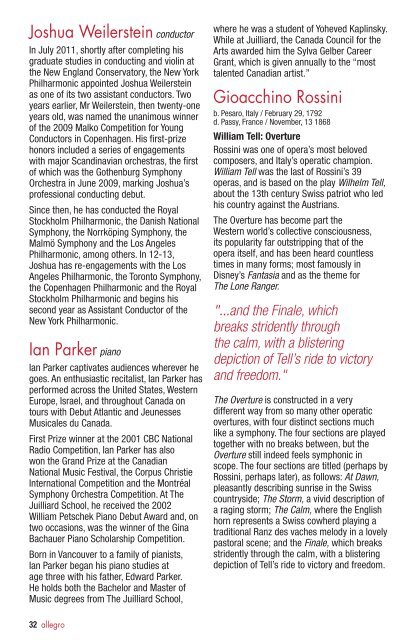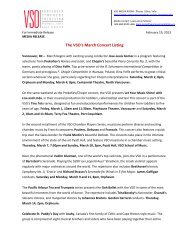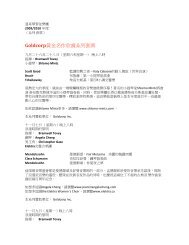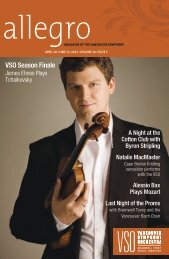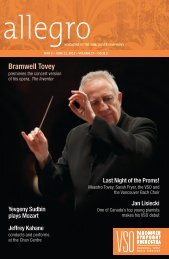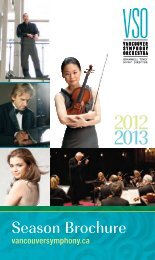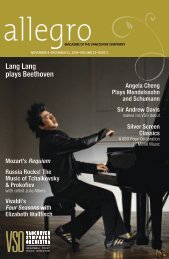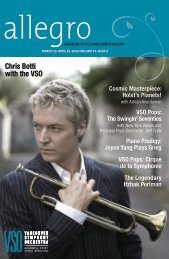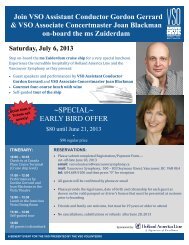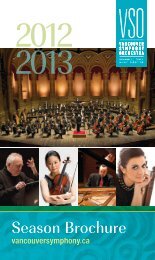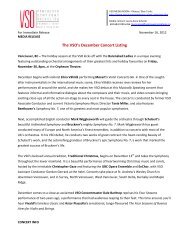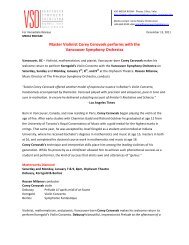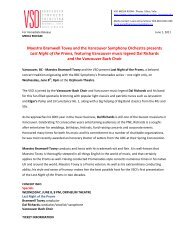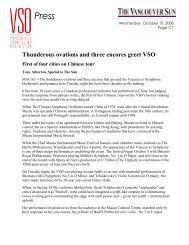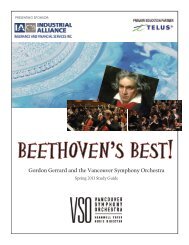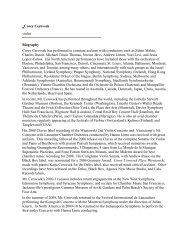issue five - Vancouver Symphony Orchestra
issue five - Vancouver Symphony Orchestra
issue five - Vancouver Symphony Orchestra
You also want an ePaper? Increase the reach of your titles
YUMPU automatically turns print PDFs into web optimized ePapers that Google loves.
Joshua Weilerstein conductor<br />
In July 2011, shortly after completing his<br />
graduate studies in conducting and violin at<br />
the New England Conservatory, the New York<br />
Philharmonic appointed Joshua Weilerstein<br />
as one of its two assistant conductors. Two<br />
years earlier, Mr Weilerstein, then twenty-one<br />
years old, was named the unanimous winner<br />
of the 2009 Malko Competition for Young<br />
Conductors in Copenhagen. His first-prize<br />
honors included a series of engagements<br />
with major Scandinavian orchestras, the first<br />
of which was the Gothenburg <strong>Symphony</strong><br />
<strong>Orchestra</strong> in June 2009, marking Joshua’s<br />
professional conducting debut.<br />
Since then, he has conducted the Royal<br />
Stockholm Philharmonic, the Danish National<br />
<strong>Symphony</strong>, the Norrköping <strong>Symphony</strong>, the<br />
Malmö <strong>Symphony</strong> and the Los Angeles<br />
Philharmonic, among others. In 12-13,<br />
Joshua has re-engagements with the Los<br />
Angeles Philharmonic, the Toronto <strong>Symphony</strong>,<br />
the Copenhagen Philharmonic and the Royal<br />
Stockholm Philharmonic and begins his<br />
second year as Assistant Conductor of the<br />
New York Philharmonic.<br />
Ian Parker piano<br />
Ian Parker captivates audiences wherever he<br />
goes. An enthusiastic recitalist, Ian Parker has<br />
performed across the United States, Western<br />
Europe, Israel, and throughout Canada on<br />
tours with Debut Atlantic and Jeunesses<br />
Musicales du Canada.<br />
First Prize winner at the 2001 CBC National<br />
Radio Competition, Ian Parker has also<br />
won the Grand Prize at the Canadian<br />
National Music Festival, the Corpus Christie<br />
International Competition and the Montréal<br />
<strong>Symphony</strong> <strong>Orchestra</strong> Competition. At The<br />
Juilliard School, he received the 2002<br />
William Petschek Piano Debut Award and, on<br />
two occasions, was the winner of the Gina<br />
Bachauer Piano Scholarship Competition.<br />
Born in <strong>Vancouver</strong> to a family of pianists,<br />
Ian Parker began his piano studies at<br />
age three with his father, Edward Parker.<br />
He holds both the Bachelor and Master of<br />
Music degrees from The Juilliard School,<br />
where he was a student of Yoheved Kaplinsky.<br />
While at Juilliard, the Canada Council for the<br />
Arts awarded him the Sylva Gelber Career<br />
Grant, which is given annually to the “most<br />
talented Canadian artist.”<br />
Gioacchino Rossini<br />
b. Pesaro, Italy / February 29, 1792<br />
d. Passy, France / November, 13 1868<br />
William Tell: Overture<br />
Rossini was one of opera’s most beloved<br />
composers, and Italy’s operatic champion.<br />
William Tell was the last of Rossini’s 39<br />
operas, and is based on the play Wilhelm Tell,<br />
about the 13th century Swiss patriot who led<br />
his country against the Austrians.<br />
The Overture has become part the<br />
Western world’s collective consciousness,<br />
its popularity far outstripping that of the<br />
opera itself, and has been heard countless<br />
times in many forms; most famously in<br />
Disney’s Fantasia and as the theme for<br />
The Lone Ranger.<br />
"...and the Finale, which<br />
breaks stridently through<br />
the calm, with a blistering<br />
depiction of Tell’s ride to victory<br />
and freedom."<br />
The Overture is constructed in a very<br />
different way from so many other operatic<br />
overtures, with four distinct sections much<br />
like a symphony. The four sections are played<br />
together with no breaks between, but the<br />
Overture still indeed feels symphonic in<br />
scope. The four sections are titled (perhaps by<br />
Rossini, perhaps later), as follows: At Dawn,<br />
pleasantly describing sunrise in the Swiss<br />
countryside; The Storm, a vivid description of<br />
a raging storm; The Calm, where the English<br />
horn represents a Swiss cowherd playing a<br />
traditional Ranz des vaches melody in a lovely<br />
pastoral scene; and the Finale, which breaks<br />
stridently through the calm, with a blistering<br />
depiction of Tell’s ride to victory and freedom.<br />
32 allegro


